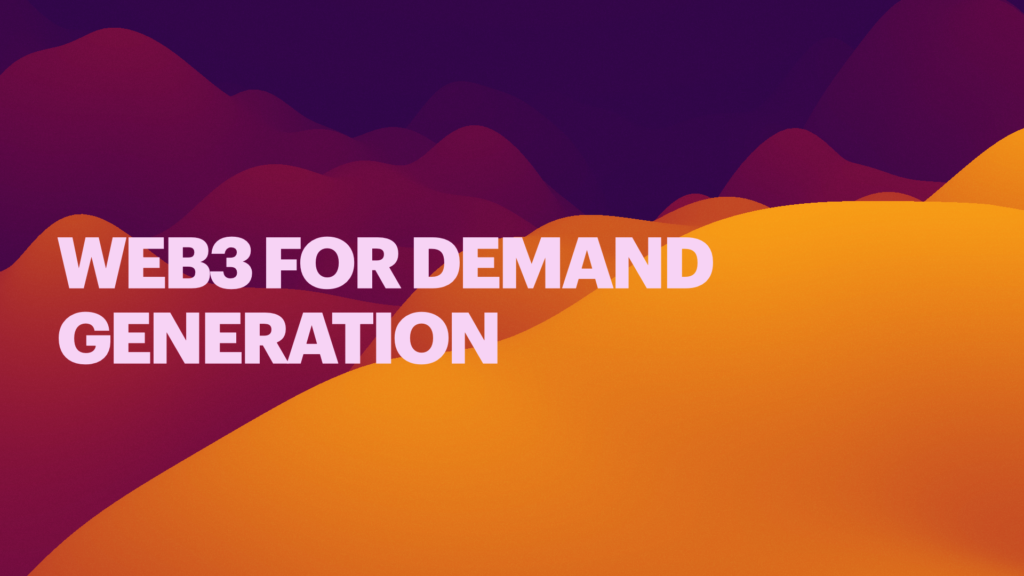Web3 for Demand Generation

As a passionate marketer, I am always interested in exploring new ways to boost demand generation efforts and take marketing strategy to the next level. If you share this passion with me, I invite you to consider leveraging web3 technology. Its usage will become a must-have in any Marketing Department with many applications, such as the one we will discuss in this post: demand generation.
From personalized marketing campaigns to increased efficiency and new marketing channels, there are countless ways that web3 technology can enhance our marketing efforts.
In this post, I explore some exciting ways that web3 technology can boost demand generation strategy and take marketing to new heights shortly:
1. Personalized Marketing:
Web3 technology allows the creation of unique, personalized digital assets that can be used for marketing purposes.
We, as marketers, know the growing importance of building a personalized experience for each audience, in terms of efficiency and conversion optimization, from the first time we impact a prospect until the last step of the purchasing process and during the whole relationship once a lead becomes a customer.
These unique Web3 digital assets can be tailored to specific customers or audiences, allowing for more targeted and effective marketing campaigns and enhancing our efforts.
Blockchain technology can potentially substitute popular marketing tools such as Google Optimize, Hubspot, Optimonk, etc., and become the next-generation tools for marketing personalization. And at the same time, it can become a powerful solution for tracking purposes after the third-party cookie disappearance.
NFTs and smart contracts will probably become key marketing tools in the coming years. They can be customized to include personal information or preferences to create unique experiences adapted for different segments of users. I have already written a post about NFTs with examples of applications in various industries.
For example, an e-commerce company could create an NFT that represents a personalized shopping experience for a customer. The NFT could include information about the customer’s past purchases, privacy consent, preferences, and customized recommendations for future purchases. This NFT could be distributed to the customer through a decentralized app (dApp), via email, or other digital channels, providing a highly personalized marketing experience.
Another way that smart contracts can be used for personalized marketing is through their self-executing feature, which allows automation in the execution with the terms of the agreement between buyer and seller being directly written into lines of code. These contracts can be customized to include personal information or preferences, allowing for the automation of personalized marketing actions.
For example, a marketing team could create a smart contract that automatically distributes personalized marketing materials to a segment of customers based on their preferences and past behavior. This could include emails, social media posts, etc., targeting each customer’s specific needs and interests.
Overall, web3 technology offers personalized marketing opportunities, enabling businesses to create highly targeted and effective campaigns that drive demand and engagement.
2. New Marketing Channels:
In previous lines, I have mentioned dApps and NFTs regarding useful Web3 technology. And we need to consider both again as they open up new marketing channels, which can be used to reach and engage with new and current audiences. A couple of months ago, I made a reflection in several Linkedin posts about how web3 could impact the Marketing Funnel. I have recently published all the information as an entire post, and you can check it here if you wish. The following are some of the new marketing channels emerging in Web3:
a. Custodial and non-custodial wallets:
Wallets can be considered new marketing channels that allocate access to powerful marketing tools such as NFTs.
These digital wallets provide access to any kind of smart contracts built on blockchain. NFTs can be used to create marketing campaigns that are interactive and immersive, engaging customers in new and innovative ways.
For example, a company might use a web3 wallet to offer promotions or rewards via NFTs to customers who make purchases or engage with the company’s dApp. NFTs could also contain discounts for users who complete specific tasks or participate in a referral program.
Also, wallets can be used to collect customer behavior data for marketing purposes in the growing world of blockchain technology.
b. Decentralized apps
dApps are applications that run on a decentralized blockchain network. They can be considered a whole channel by themselves, which can also be accessed through wallets. And can be used to create interactive and immersive marketing experiences for customers, such as virtual reality campaigns or gamified marketing efforts, being a great opportunity for brands to boost demand generation.
3. Increased Efficiency
Efficiency is a crucial factor in any business, and web3 technology has the potential to enhance efficiency in many ways significantly. It can streamline marketing processes and make them more efficient. And regarding demand generation, one of the main KPIs is the conversion rate along each step in our marketing funnel, which directly affects our CPA (Cost per Acquisition).
Here are a few key ways that web3 technology can increase efficiency:
- Automation: I imagine marketing automation using smart contracts 10x simplified, avoiding integrations between different tools and channels, and being able to adapt every single step in a process to our brand and performance needs.
- Real-time data: Web3 technology allows for the creation of decentralized databases, which can store and track data. So applying corrector factors in real-time, as the interactions are happening, will also be easier and instantly. For example, let’s think about a social media dApp with no hidden algorithms. Smart contracts will also be the vehicle for transparency when applying certain benefits or rewards based on individual activity data.
- Interoperability allowance: dApps built by different brands will be easily connected and integrated thanks to decentralization and the usage of standard protocols. Interoperability will enhance synergies created with partners and amplify co-branding and co-marketing actions.
Overall, web3 technology has the potential to significantly increase efficiency in various industries, helping businesses to operate more smoothly and effectively. By automating processes and streamlining operations, web3 technology can help companies to save time and resources, letting the talent focus on more impactful activities, leading to increased productivity and profitability.
4. Increased Engagement
Increased engagement is a crucial marketing campaign goal to increase purchase frequency and generate customer advocacy for higher demand.
Web3 technology has the potential to enhance customer engagement significantly. Here are a few key ways web3 technology can increase engagement:
a. Immersive marketing experiences: to engage customers in new and innovative ways. For example, a business could use non-fungible tokens (NFTs) to create interactive campaigns that allow customers to engage with a brand more meaningfully, co-creating brand content and even new products.
b. Gamification: Web3 technology can be used to gamify marketing campaigns, making them more engaging and fun for customers. For example, a business could create a decentralized app (dApp) that includes a game or quiz that customers can participate in to win prizes or rewards.
c. Personalization: Web3 technology allows the creation of personalized digital assets. It makes it possible to create unique NFTs for each customer while maintaining affordable prices and accessibility to everyone, tailoring services and solutions for the specific customer and audience needs.
All-around, web3 technology can increase customer engagement by creating immersive, personalized, and gamified marketing experiences. By leveraging these capabilities, we can create more effective marketing campaigns that drive demand and also loyalty.
5. Trust and Transparency
A sense of trust and transparency is key to purchasing decisions and can be a demand booster, especially in industries such as finance and healthcare.
And at the same time, building transparent relationships with users and communities is becoming strategic for most corporations as the customer demand for brands with purpose and aligned values grows. This will probably become a must-have for any brand from now to the following years.
dApps are a clear example; running on a decentralized network rather than a centralized server, they are more resistant to censorship, tampering, and downtime, making them more trustworthy and transparent than traditional centralized apps. For example, a financial company could create a dApp that allows customers to track their investments in real-time, allowing customers to see exactly where their money is going and how it performs at any time.
Another example of a use case could be a smart contract in which a company publishes its brand manifesto, and KPIs, sharing the performance evolution in real-time. Brand promise regarding the kind of resources, materials, and processes involved in product creation can also be tracked, documented, and accessible to everyone by using smart contracts.
In terms of demand generation, web3 can help businesses to build stronger relationships with customers and clients based on trust and transparency.
6. Tracking and Data-Driven Strategies
Data-driven decisions are crucial to managing demand generation in every marketing department. Web3 technologies, such as blockchain and decentralized applications (DApps), will likely become essential in marketing in a cookieless scenario because they provide a way for marketers to gather and use data in a more privacy-conscious and secure manner.
Web3 solutions are perfect substitutes for cookies by providing a decentralized, safe, and privacy-conscious way to collect and use data. For example, a marketer could use a blockchain-based platform to gather data on users’ preferences and interests while allowing users to opt-in or out of data collection and use. This approach gives users more control over their data and helps build trust.
Additionally, web3 technologies can provide a more secure and transparent way to collect and use data, as the data is stored on a decentralized ledger that is transparent and tamper-proof. This can also build trust with users and ensure that their data is used responsibly and ethically.
Overall, the adoption of web3 technologies in marketing is likely to increase as the use of cookies becomes more restricted and consumers become more concerned about their online privacy.
In conclusion, by providing a privacy-conscious and secure way to collect and use data, web3 can help marketers to adapt to the cookieless environment and continue to reach and engage the target audience effectively.
What do you think? What other ways to enhance demand generation marketing strategies do you find interesting by using web3 technology?
Please, comment above 👇 And if you need help with this, don’t hesitate to contact me. I will help you apply the best solutions to your particular needs.

Leave a Reply
You must be logged in to post a comment.